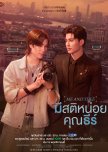
I adored the first 5 episodes, liked the sixth -- but then the drama went downhill. Actually, I was slightly bored when the end credits of last episode started.
The first half of "Me and Thee" took several tropes, like the age-old "love conquers class differences", the "rich people are detached from reality" and a few others, and played with them -- inverted or subverted them, played them for laughs and so on (cf. https://tvtropes.org/pmwiki/pmwiki.php/Main/PlayingWithATrope). Khun Thee was the perfect mix of clueless and charming, with his lakorn-style over-the-top view of how the world works, and he made me like him a lot, even though I usually despise the ultra-rich.
I adored the silliness that at times bordered on the absurd, and thought I'd understood why this series got so much praise.
But even in the first episodes it was very obvious that the post-production team was doing the heavy lifting. The precise work in the cutting room as well as the clever use of background music were what brought the comedy to the on-point timing it had. I can see that Pond ("Thee") did his best -- and he wasn't bad at all! -- but in my view, his role would have deserved an actor with the abilities to *really* lean into the absurdity of the character's quirks.
Thee and Peach are a classic comedic duo (aka "double act"), with Peach taking over the "straight man" and Thee being the "comic"; and they would have been brilliant if both actors were able to play it up much, much more, so that most of the comedy comes from their own performance and not from the work of the post production team.
Better acting abilities might have also ironed out the weaknesses of the screenplay in the second half to some degree.
Because the screenplay let me down from episode 6 or 7 onwards: It decided to pivot away from playing with the tropes to playing them straight, but not to the point where they got funny again -- and that reduced the charm of the first episodes to a minimum and left only the eye-roll-inducing cheesiness. Great comedic moments were few and far between, and that was just not enough to keep up the energy of the first half.
An excellent screenplay would have been able to keep up the comedy *and* develop the romance at the same time -- but the comedy was reduced in favour of ramping up the romance. Unfortunately, the repeated use of the same tropes -- once to play with them, then playing them straight -- doesn't work for me at all. The romance part of the script also failed for me, see below.
The writer *also* tried to give some character growth, depth and background to their main characters. On the one hand, I love some depth with my comedy. On the other, the way they did it causes inconsistencies with previously set-up characterisations.
And I don't understand why this happens again and again (Ossan's Love Thailand is another example of this) -- Thailand has some very good screenwriters, and Thai productions are often surprisingly excellent at integrating different genres into one story, and even giving it some additional depth by doing so; but with GMMTV BLs, this just doesn't happen.
Overall, the last four episodes should have been condensed into two, to keep up the comedic energy of the first half, and maybe they shouldn't have tried to make it swoon-worthy romantic, if they can neither integrate it with the comedy nor deliver a heart-felt romance.
And that is a problem that quite a few (GMMTV) productions have: If you want to make a story romantic, then commit to it and make it so.
But the love and attraction just isn't there to see. Really, have any of the people working on the drama -- writers, director, actors -- never seen a couple in the springtime of their love? I don't mean the continuous snogging of teenaged couples or explicit sex scenes. But new couples in real life (yes, exen if they are adults) can't help themselves: they touch each other often, sometimes as little as a small brush on the shoulder, they look at each other constantly, they seek to be as close to each other as possible. None of these things can be seen here. On the contrary, Peach continues to hold Thee at arms length at every turn, and stays passive whenever Thee initiates physical intimacy. It's as if he doesn't even want any of it! Up to the point that Peach initiating a kiss is somehow a big thing -- in the last episode, *after* both of them vowed to stay together.
Maybe it could have worked if the second half of the drama had reversed the roles of the "double act": Make Thee the "straight man" and give Peach the role of the "comic"; for example make his "reluctant bottom" role carry the comedy. Even if that has been done many times before, it might have given the series a second wind that could have carried it to the finish.
That Phuwin's ("Peach") acting abilities are limited only makes things worse. In emotional moments, Phuwin is not able to convey fear, grief, love or any other deep emotion to a point where I can feel with his character.
Both of these two points combined make for a relationship dynamic that is severely lopsided -- from Thee's side we get the over-the-top, I-would-die-or-at-least-buy-all-of-Thailand-for-him romance, from Peach's side we get a grudging friendship.
Other than that (and let's not speak about the ubiquitous product placements, which were occasionally, but not often enough, well integrated into the script), there were some holes and contradictions in the way some points were resolved. Which is not a problem per se in a comedy of the style they had in the first half -- and could have been used to keep the drama on the silly, even absurd side of things. But it wasn't, see above.
Was it good?
The first half was brilliant, especially due to excellent use of cuts and background music. But then a combination of unfocussed writing and average acting made the comedy lose its steam and the series lose its charm.
Did I like it?
As with most GMMTV productions, this was an easy watch. But while I loved the first half, I was bored by the second.
Would I recommend it?
I don't think so. But "Me and Thee" is adored by many, so I recommend that every one should see for themselves.
Was this review helpful to you?

This cute romance could have had more depth
What starts as an ordinary "opposites attract" romance -- Ji Won is shy and avoids public scrutiny, while Jeong Woo thrives in it -- with inconsistent characterisations and tropey situations, turns out to be a drama that has a story to tell about homophobia in professional sports. Unfortunately that is only after it's found its stride near the end of the third episode, which is late in a drama of eight episodes.Overall, it feels as if the writers found it too challenging to adapt the original novel into an eight-episode drama, couldn't decide which kind of story they wanted to tell, and just kept it to the bare bones of the romance part.
(Disclosure: I haven't read the novel, so I can only assume that it has a much more detailed and hopefully deeper story.)
I feel more than the usual disconnect I sometimes have with the Korean acting style, and I feel it's only in part due to the actors being rookies. I think most of it is the script, which leaves large parts of the two main characters unexplored, and doesn't give the actors much to work with:
* Why does blow Jeong Woo hot and cold in the beginning? What are his emotions and his motivations at that time?
* Who is Jeong Woo, where does he come from, why does he play basketball, what does he want in life? What has influenced him so far?
* Where exactly does Ji Won's anxiety about being observed come from? Does it have to do with the (hinted at) abuse he suffered from his first coach?
* What is Ji Won's relationship with his parents like? What part did *they* play in his youth?
* Does he know he's gay before meeting Jeong Woo or not?
* How old is he, and in which year are the basketballers? (I think one of the friends said Ji Won was 22, and they are all the same age -- are Jeong Woo and his friends in fourth year then?)
* How much time passes between scenes and over the course of the drama?
* Several times there are inconsistencies or it's obvious that characters reference happenings that are never shown, or mentioned anywhere else in the drama.
With it, the most interesting parts of the story are only hinted at: How much impact the rampant homophobia in professional sports has -- and how it forces athletes to hide large parts of themselves. How public scrutiny of celebrities can affect their psyche. How abusive the system can be for minors who often are at the mercy of their trainers.
The story had the potential to be much more than another cute romance, which is a shame.
Some thoughts about the directing and editing: I wish the director had been a bit more adventurous. She shows that she is capable of making interesting decisions, like having the camera shake in one emotional scene or using background music sparingly, and letting silence speak for itself. But in more than a few scenes, dialogues are delivered while the characters are standing in front of each other, facing the other character head-on; or walking at a snail's pace -- which reminds me of the static scenes in "Light On Me". This also contributes to the feeling that the acting is seemingly not that good; which is not quite true, because as soon as the actors get to do something and their characters have a clear motivation for their actions the scenes become much more lively and approachable.
One thing that suprised me in the best way: When one character comes out to his friends, he uses the words "gay" and "bi", which is a very rare thing in BLs.
Was it good?
The drama was better than I expected, in that it didn't pretend that all is easily accepted in BL-Land, but that homophobia, especially in certain places like pro sports, exists and restricts the lives of queer people.
Did I like it?
I liked it fine, but mainly because I didn't expect much. It also wasn't the deepest of K-BLs.
Who would I recommend it to?
To those who generally get on with the style of K-BLs, like campus romance and Korean cuties.
Was this review helpful to you?

some background knowledge needed, otherwise excellent movie about the creation of anime series
[Edit to add a warning if you're photosensitve or are currently suffering from a migraine, the fast pace, the use of lighting and / or the jumpy half-finished aminations seem to have an adverse effect on some people.]The film dumps you right in the middle of things. I did not understand at all what was happening until about the 35 minutes mark, and even then it took me another 10 to 15 minutes to really get it. I went in cold -- did not even read much more than the tags on the Japanese Film Festival Online 2024 website -- anime, business, drama -- so I had no idea what this film was about.
Several other things that probably did not help was that a) the Japanese names and titles that were shown with each introduction of a new character often were not translated and b) I do not know anything about the anime industry; also, c) it is not clear in the beginning which secondary characters will be important and which will be not, and most of them are introduced rather fast, so I was not able to keep track of them, and tended to mix them up in later scenes, as well as d) the sets for the two studios also look very similar, and e) I didn't know which anime series was which (because we only hear about the plot after about 40 minutes of runtime).
For the story, this is what I think would have helped to know: There are two production studios, who simultaneously make an anime series each -- both series are scheduled to air at the same time, so they will be direct competitors.
"Soundback" is directed by newbie Saito Hitomi (the woman with the glasses) and her producer is Yukishiro Osamu (sleek guy in a suit), it's colour coded as light blue. This is the one with the two sisters and the group of kids from a rural town.
"Liddell Light" is directed by Oji Chiharu who had a huge hit eight years ago (guy with tousled hair) and his producer is Arishina Kayako (woman, usually in business attire), it's colour coded as pink. This one is about a magical girl on a racing bike (or something like that).
So, live action scenes are supplemented by animations from both series (often half-finished) and also by animated scenes where the ratings and reactions from the audience are shown to us (this is where the colour coding comes in).
The main struggle might be between the creativity of the directors and the constraints of the market (an anime has to be commercially successful!). It also might be between the two directors, who compete and try to make the superior anime (which is where the title comes from). The film is much more complex and can't be reduced to just one "message" -- there are other stories below that, so it is worth to look a bit closer -- what seems the main issue in the beginning might not be what's actually important.
As soon as I got the hang of things, the film was excellent. Of course, the acting is incredible, but I was particularly impressed with the camera work and the editing. Fast-paced scenes in cramped and dark spaces are directly followed by slower, even contemplative scenes.
I loved the use of space and light, of static filming and of following moving characters with the camera -- it's quite obvious that a lot of thought has gone into this.
For example: the fast, almost oppressive, mood in the beginning is countered by an equally fast, but uplifting, mood in the last part -- we have the same sets, the same cast, the same time constraints to finish work, but they feel completely opposite, showing and underlining the main characters' state of mind.
Which is why I think some more time would have been good, maybe even as little as fifteen minutes or so, so that I could have been less confused in the beginning. In my opinion it must be possible to understand a film even if you know nothing about it before hand, even if you're not familiar with the subject (i.e. the making of animes in this case).
I also think that I did not get as close to the characters as I want to, there's no real connection there -- some more time would have helped with this too.
One last comment: I love that the male characters don't overshadow the female characters -- they have all their unique focus and their own strong personality. (Dare I even say it? I think both female main characters have a stronger personality than the male characters.)
Overall, I liked it and I learned something new about making anime, so that's a plus.
If you go into the film with the background info I gave above, and maybe a bit of knowledge of the anime industry, then I think you'll enjoy it.
Was this review helpful to you?

PWTP -- Porn With Travel Promotion, part 2 (now with added plot!)
Someone watched "Kiseki Chapter 2", and really said "This makes me want to sponsor a second season"? Well, why not.Compared to the prequel, this one was an improvement, which isn't saying much -- it's still soft porn with travel advertisement more than anything else.
The outside shots in Japan were certainly not bad, and the actors were certainly better than before -- although I can't say whether this was because they had better directing (or rather, any directing at all) or because they were more comfortable in their presence before a camera.
The sex scenes were longer and more detailed, and had more variety than in the previous drama. Whether they are in any way realistic, I'll leave that to every viewer's own judgement. I did like that most of the sex scenes with P and Pan had a certain levity and a good amount of playfulness to them, which I haven't often seen in BLs.
We also got somewhat of a story, and I think that contributed to the overall feeling that this season was more cohesive than the one before. I do wish that this premise (namely how the Thai way of promoting artists with "imagined couples" severely impacts their private life) were devoloped into a better story, there's a lot of potential there.
I think the plot -- simple as it is -- made the outings much better than in the prequel, in that I didn't make me want to skip the scenes; and it gave me a bit of background to connect with the characters. It also grounded the sex scenes a bit more and made them feel warmer than those in "Chapter 2".
And I admit it, I like the manager, even with all the toilet humour (he should definitely see a doctor about his bowel movements), and I hope he'll find his own lover some day.
The camera work is still on an elementary level, and especially the outing in the last episode looked and felt like an average vlog post.
That last episode was a let down plot-wise too -- I had hoped for a better resolution of the problem than just "yeah, the other hashtag is trending now, so it's all good" -- and in the last few minutes, it just kind of fizzled out.
This is one of those dramas I choose to watch when I am feeling physically unwell, as it doesn't require me to engage with anything much, and still is somewhat entertaining.
To be honest, there are Thai BLs with worse plots and/or acting ("Coffee Melody", "The Renovation", "2Gether", "Bad Guy My Boss") which nevertheless get loved by some because the actors are "cute" or something like that.
However, I can't in good conscience recommend this drama.
Was this review helpful to you?
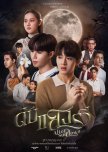
Heteronormativity at its finest
Change the character of Rawee into a woman, and you'll get an old-fashioned, tropey romance movie with a supernatural side.Why?
Rawee is the typical young orphan, who is brought into the house of a new family, first of unclear status, then gets engaged to/married off to the family`s son.
Rawee stays at home and makes desserts for the family, while Phloeng is outside, doing business things. Rawee is easily hurt, and the manly Phloeng carries her, sorry, him, because Rawee obviously can't walk on his own after scraping a knee. Phloeng is the one who gets jealous and overall is the one who pushes their relationship to the next levels.
Apart from one remark at the beginning, Rawee's gender has no relevance at all.
There's really no point in Rawee being a man. (Because the character isn't, it's just a male body in a female role.)
(Edit to add: And it's a stereotypically "weak" female role, at that. I like women to have more agency, and Rawee basically has none.)
The side couple really had no relevance to the story (at first I thought maybe the ghost would use it, but no.) and could have been left out. Instead the time could have been used to tell the ghost's story in more detail.
The acting was all right, good by the seasoned actors. Cinematography was fine, music non-remarkable.
Sets were appropriate for the early 1960s, as far as I can tell. I'm not too sure about the clothing -- in Europe no man would have just casually worn a T-Shirt, and short trousers for a young men of 21 years would have been a no-go. but I'm not familiar with Thailand's fashion in the 1950s and 1960s, so they might be okay.
Well, at least now I can point to another movie whenever I want to show what I mean when I talk about heteronormativity in BL dramas and movies.
Was this review helpful to you?
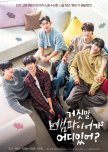
I do think that the drama did well regarding sets, casting and directing. The actors were good for rookies, and the way they were styled and dressed and the set design gave the drama a distinct flavour.
Another aspect that I liked were the characters themselves, who were charming -- everyone had his own personality too.
But the one thing that I find most important was lacking: the story.
Yes, I know. It's a cute and fluffy love story -- don't expect much depth, right? And if this was all the drama would be, then it would have been fine. I could live with "vampires" being just the framework for the story. I could live with a simple tropey love story.
The problem here is that they tease with hints of world building but never deliver. There is no singular vampire lore that every vampire story uses; it's rather that there are many, at times conflicting, takes on how vampires "are" -- can they be exposed to sunlight? Are they born or made? Are they shape shifters? How do families work -- is it more coven-like or more like a human family? Can they eat human food? And many more.
And "My Secret Vampire" seems to think that viewers know these answers already (when they don't), so they never explain them. Or maybe even worse, it seems that the vampire lore here contradicts itself, the vampires can't eat human food, but then they are looking forward to Dongha's eggy toast? At times, I can't decide if the script is bad at keeping to its own world rules or if the character development is just not written well: Seonjae claims that "relations between vampires and humans never end well" but then he supports their relationship?
I could give more, and better, examples, but I want to avoid spoilers.
Overall, the drama had potential in its premise, in the actors, and in the design quality, but it's let down by confused writing that fails to explore its world to the point where I understand the world's rules.
Was it good?
It's so-so. It's entertaining, sure, but leaves more questions than it answered.
Did I like it?
I would have liked it more if the script were better.
Who would I recommend it to?
I would not recommend it at all.
Was this review helpful to you?
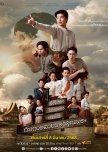
* comedy
* crime / detective
* lakorn
It also criticises classism and sexism, and the resulting power imbalance and the injustice of the (Thai) judicial system. And it has a ghost. Of course it has.
Overall, it was an engaging watch -- the characters, from the three main characters to the supporting characters, were interesting, and I rooted for Thongbai, Maiphlong and Sangthong. The way the story was told, with all its twists and turns, made me want to know the culprit. And at the same time, I enjoyed the journey of it, the emotional highs and lows, the drama and the comedy.
The latter is something not everybody might get along with: (Melo)Drama goes hand in hand with the comedy, the mood often switches from one to the other within the same scene and without any warning. I myself like this style, I must say, and I have always preferred my crime&mystery with a side of comedic relief and my comedy with a bit of depth. The writing was very consistent in that regard, and even though the comedy was a bit stronger in the beginning episodes, it was never overshadowed by the dramatic parts. Conversely, the comedy never made the darker parts -- the injustice, the suffering -- any smaller than they should be. They simply co-existed side-by-side.
(The writing was not as consistent in some other details, but I can forgive that.)
The script would be nothing without the passion that the lead actors put in their acting: The three main protagonists were delightfully overdramatic in the comedy bits, but also subdued when necessary. Khun Phra was exactly the kind of sleazy you love to hate -- while the suspects' actors, who all got one to two-and-a-half episodes for their story, captured the essence of their characters and delivered heartfelt backstories.
Something that needs to be mentioned is that although this drama is advertised as "historical", it is not. It is set in a sort of parallel quasi-historical fantasy world, not because of the ghost (for what is a Thai story without a ghost or two?) but because of the many, many intentional anachronisms: It starts with characters using English expressions and Thongbai inventing a scooter, it continues with ahistorical police uniforms, the sort of clothes, furniture and radios you'd find in the early 20th century, when slavery had already been abolished in Thailand, and it ends with the solar eclipse. I needed some time to accept that this drama was not supposed to be a historical drama, but that most of it was part of the comedy or else just didn't matter, but once I did, I had great fun with these anachronisms.
What I really didn't like was how the script handled the last two twists that revealed the murderer -- not the twists themselves, which aligned neatly with the characterisation of Khun Phra as we've seen him throughout the series, but with the reveal, which felt like lazy writing and is, in my view, an insult to the detective genre. And that's a crying shame, because up until then, it felt very "Christie", in the way that the three investigating characters followed clues, were told the background stories for each suspect, and in the way that the narrative made me suspect *everybody* at least once, even the little ghost girl. So, I felt a bit betrayed by that, because a good classic Whodunnit scatters clues throughout the story, so the reader/viewer can either investigate along with the detective characters or make a sound of "Why did I *not see* that?", and "Khun Phra" didn't do that.
Something I also wasn't too fond of, was that they spelled out the criticism at the end of the drama. Anyone who has watched the previous episodes should have seen their message already, they really weren't subtle about it -- so, the dialogue at the end about equality and justice felt like the writers thought we were too stupid to understand it ourselves. But, well, it might be that the writers felt it had to be there as part of the sweet-sweet ending they gave us.
Was it good? -- It was very Thai, in the way the script pointed to social problems, and in the comedy style. The drama has its flaws but ultimately, it hits all the right notes.
Did I like it? -- Yes. It was gripping, and even though I didn't like the reveal of the real culprit, I loved the journey.
Who would I recommend it to? -- Mainly to people who are already familiar with the Thai style of storytelling and with the Thai style of comedy, others might find it more irritating than likeable.
Was this review helpful to you?
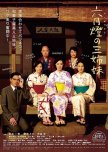
Three Sisters' Relationships with Men
For a film that is supposed to be about three sisters, it was more about their relationships with the men in their life than about them.This is a slice-of-life story that unfolds in Kagoshima where people prepare for their Summer Festival, a week-long festival where shrines and streets are decorated by beautifully hand-painted lanterns. And, as expected by a film chosen for the JFF Theater, it's very well done in these two regards. The ordinary interactions between the cast, the awkwardness and the unintentionally funny things that happen, as well as the background characters and their slightly sexist remarks -- they all feel very realistic. The cityscape with its old-fashioned trams and little shops, and with the lit lanterns during the festival makes for a vibrant background.
If only it wasn't for the story.
A better title would have been "The hetero relationships of three women" -- because the film does not explore the sisterly relationships very well -- and if it does, it's always in the context of the relationships to men. Even when the two older sisters talk about being sepearated during childhood, it wasn't about their own experiences, or how it shaped their relationships as sisters, no, it was about how it was living with (or without) a father. Even when the two older sisters try to lift their youngest sister's spirits, it's with the thought in mind that she is good enough to deserve a good man.
The shop and its problems stay part of the colourful background, the familial bonds are solely defined by their talks about the men in their life. The eldest sister has no character at all (except that she is divorced and a nice person), the middle sister does have an interest outside of family, but it's mainly mentioned in the context of her meeting another man, and only in the last minutes does the youngest sister show that she has an aspiration that is solely her own (and which needs her father's approval, although the shop belongs to the mother).
I *think* this was not the writer's goal. I *think* what he or she *wanted* was to tell a tale about three sisters and her mother, their familial bond and how they decide to live independently or with a man by themselves and solely because of their own feelings, and not because they feel pressured (by outside expectations) to do it. And, yes, that might be a story that is worthy of telling -- but maybe not to the detriment of the women's own characterization.
Was it good? -- The film probably passes the Bechdel test. Barely. The lanterns were pretty though, and the slice-of-life aspect was well done.
Did I like it? -- It think the story the writer wanted to tell is not the story we got to see. I found it incredibly frustrating to watch a film about three women that was not about them.
Who would I recommend it to? -- Maybe to people who like to see women's relationships with men?
Was this review helpful to you?
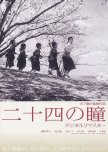
Of historical interest -- and also very moving. I cried.
The way "Twenty-four Eyes" is filmed, is period-typical for a movie, especially one that is not about action but tries to explore characters. I watched more than a few western films from the fourties and fifties, so I was already familiar with the style of acting and filming, as well as the sound quality (especially voices and singing have a special "ring" to them, which is hard to describe.) For people who are not used to this, the movie might feel strangely slow and static.With 2 hours and 36 minutes, the film is quite long, even for modern standards. There are three parts:
First, we meet the twelve children and her teacher in the first grade. For both the children and the teacher their roles at school are new and unfamiliar -- and while it might seem as if not much is happening, the freedom and serenity of this first hour is a good contrast to the following parts. After a time skip of five years, teacher and children meet again in the children's sixth grade, the last obligatory school grade back then -- we'll see how both the children's families and the growing nationalism (with it, the looming war) will shape their futures. And, lastly, vignettes of the following years of war and death, and how it impacts even that small Japanese island. There's also some time dedicated to the aftermath -- children, now young adults with their own kids, and the teacher reunite, look back to their shared past and then into the future.
I think for anyone who wants to watch this in the 21st century, it is important to be aware that the year that the film was shown
in cinemas -- 1954 -- is only nine years after the end of World War Two. So, these children (young adults in the later parts) could have been themselves, their children, their brothers, sisters, husbands and wives. I can imagine that the film was cathartic for the audience back then; it definitely must have had a stronger emotional impact than it could ever have for me.
Besides the emotional journey, and the reminder of how nationalism and senseless wars (and all wars are senseless) will destroy lives, for me the film also gave me a chance to see Japan as it was 70 to 90 years ago. We get to see two rural schools and a glimpse of teaching and learning; we see the houses in the fishing village; we hear people's thoughts on poverty, proper manners, women, family. I loved seeing how the style of clothing changed from 1928 to 1946.
(The film had the advantage that everything was very recent, so sets are probably authentic buildings and streets, and the people who made it could just remember how it was. No extra research needed.)
There are quite a few scenes that were very poignant, such as the teacher's despair that nationalist teachings had overtaken everything at school, or the scene after the war ended when her eldest son is not able to grasp that everything he believed was now supposed to be wrong.
One thing that I was a bit disappointing was that the songs's texts (the children sing quite often) were not translated in the subtitles. I think these were mostly Japanese folk and children's songs, and the texts probably underlined the emotions of the scenes -- but the international audience won't know them. It's not the fault of the film, but disappointeing nevertheless.
Overall, if you have the chance to watch it, do so!
Was this review helpful to you?
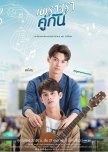
This review may contain spoilers
I was promised the "fake relationship" trope, but I just got "jealousy" as the main plot device.
Let's talk about the first half of the series:Sarawat is supposed to act as Tine's fake boyfriend, which btw is dropped in favour of "flirting" ("wooing" would be a better translation) -- but where are the sweet gestures of love?
Until the second half of episode six, Sarawat only looks either bored or annoyed. He never looks as if he's interested in Tine, faked or not. If I were Green I wouldn't buy it either.
I only knew he would be the main love interest because the synopsis told me so. Where are the feelings? Where's the pining? Sarawat's side of the story is only told in episode 10 or 11, which is too little, too late.
Tine, the self-proclaimed "Mr Chic-Chic" is (almost aggressively) heterosexual -- his only interests are girls and songs from one band. Even when he tried to dissuade Green from pursuing him, he starts to flirt with girls in front of him and Sarawat. If he's so certain of his sexuality, there should have been more of a struggle or at least emotional imbalance until he accepts his own feelings toward Sarawat.
I had hoped the "gay for you" trope had died a silent death some twenty years ago but it seems it's still alive and kicking.
Also: Even though he's supposed to be a good cheerleader, we only see him standing around in one pose (and even that plot point is dropped in the latter half otf the series).
Jealousy is not only the main catalyst for Tine to discover his own feelings, but also the main plot device for conflict in the following episodes, which gets old very fast.
Even when Sarawat and Tine are "together", the only strong emotion they show towards each other is jealousy. No besotted smiles, no casual touches, no hugs, nothing. Where's the giddiness of new love?
They touch each other less then they touch their friends. I'm not talking about anything above a PG level of intimacy, several other BL dramas I love have only one kiss or not even that.
Tine's continued denial of Sarawat's advances make it seem as if he's not actually in love -- except if it's supposed romantic but asexual. (Which would actually be a novel and exciting concept for a romance drama, if done right!) But as the series has established Tine as somone strongly interested in (het) relationships, that can't be it.
I feel that conflicts during the series were never satisfyingly resolved, but just ended with some kind of deus ex machina device. Best examples: How Green stopped pursuing Tine; and the question if Tine's brother would accept their relationship.
Another thing that made me really frustrated with this drama is that boundaries are often disregarded. It starts with Green who gets told repeatedly his advances are not welcome -- and continues anyways. It goes on with Tine, who doesn't stop bothering Sawrawat (doesn't matter if Sarawat actually likes it or not -- what counts is what Tine knows, and Sarawat clearly tells him to go away). It doesn't stop with the side couples -- neither Sarawat's brother nor Man stop their pursuit, even after being told to leave. I can't enjoy a relationship if it feels as if one pertner just gave in to harrassment.
I'm not sure if it's just the plot or also the acting, but directing has definitely a large part in why I could not get into the series. I disliked all of the characters, there was never a moment when I rooted for any of the couples to get together. Small changes in how lovers-to-be interacted with each other would have made it a bit better, at least.
There are other points, I would have liked to talk about the female characters for example or to wonder how they manage to establish top/bottom-dynamics in all four couples without even a bit of handholding, but this review is already long enough.
All in all, I had to stop and do something else every few minutes, since the plot and the acting had me so frustrated. I just finished it because I knew I'd never pick it up again if I stopped. I'm glad it's over.
Was this review helpful to you?

This review may contain spoilers
Little Gem
I watched this series on Viki, in the edited 12-episode-format.Some people have mentioned that it's obviously low-budget -- but I think if the story and the story-telling is good, things like this don't matter much. And the story-telling is excellent!
First, the series is set both in our present and in the past (or maybe dreams) -- and they are beautifully interwoven. I loved how smoothly the transitions between both worlds are done.
There are five sub-plots (or rather short stories) about friendship, familial love, romantic love -- about loss, letting go, sacrifice, and healing. These are cleverly tied together by the "Demon Bar", a place where demons meet, and destiny brings customers to ... well, to what? To dream? To tell their story? To relive past lives?
What is real, what is a dream -- this is never quite clear; and in the moment when the sommelier (the demon hunter?) maybe grasps an important part of the truth -- the series is over.
I wouldn't even be sad if there's never going to be a second season, this ending is kind of perfect.
Throughout all of these sub-stories, we also follow the friendship (and it can't be more, it's from China) of the demon hunter and the dragon. The former gets some backstory and also some character development; the latter unfortunately not. Maybe he is supposed to remain shrouded in mystery.
On a personal note: I laughed a lot -- but I also cried at the end of every sub-story, especially the first two had me bawling my eyes out.
Was this review helpful to you?
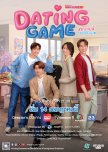
Easy entertainment with a goodish bit of depth, just how I like it
"Dating Game" combines two of my most favourite romance tropes: One of them is "fake dating" and the other ... would be a major spoiler. Overall, it's a sweet, easy-to-watch rom-com with experienced actors and solid direction. Don't expect drawn-out external conflicts, but do expect a consistently developed love story of two endearing men with some depth for those who appreciate it.As I see it, the series can be read on three levels:
1. As a tropey and fun rom-com, where the tropes are used in fresh and occasionally unusual ways.
2. As a sweet love story about people who were hurt in the past and find comfort and complete trust in each other.
3. As a reflection on identity, homophobia and the social construct of "gender", the difference between parasocial and real relationships, the importance of companionship and what it means to love a person.
Each of the three possible readings is as valid as the other two -- and I think that's the intention. The depth of the third reading is cleverly hidden in the spaces between the tropes and the sweetness. It never overpowers the easy entertainment of a weekday evening series (it aired on Mondays at 21:30 Thai local time); it's spelled out in the first episode, but in a language only accessible to those who have already learned not to judge; it's hinted at in the following episodes, and with the reveal of the second major trope (see above) and the following conversations between Hill and Junji; it's made very clear again for those viewers who like to find a bit of depth in their romance.
A drama like this needs to be character-driven, and this is where "Dating Game" shines: Both of the main leads are extremely well written -- every action has a reason, and their development follows a gentle and consistent logic that leads us through tropes and beyond clichés. Junji, for example, seems to be just the usual tsundere, or maybe a stereotypical "reserved Japanese man among exuberant Thais", an impression that is strangely at odds with Junji's remarkable choice of wardrobe. I myself thought that Mukai's acting was feeling a bit stiff, or maybe awkward, and his pronunciation of the Thai language was halting, as if he wasn't quite comfortable with the Thai style of acting -- but then in one of the later episodes we get to see *why* -- not spelled out in words, but still very obviously shown.
March Chutavuth and Mukai Koji both bring in every ounce of their experience to deliver subtle and moving performances. (In Mukai's case, it's so subtle you don't even see his personality until he chooses to show it to us -- or if you already know what to look for.)
But, alas! The second couple is not as well developed. Their actors, Fluke Natouch and Judo Tantachj, both do their very best -- but the characters are simply not well written. Phat's character and his background would make a great lakorn with all its twists and turns and family shenanigans, whereas Bay has no character at all. They follow every standard cliché of a (Thai) BL couple, from the stereotypical seme/uke characteristics to the episode 11 curse -- and their story only touches on the themes of the main story peripherally, and overall has a very different feel to it. To be honest, it feels as if they are only there to fill time, so the series has its standard twelve-episode format.
It's a shame because both Phat and Bay are interesting characters in their own right and would have added to the main plot — but as individuals, not as a couple.
Was it good?
This is Thai entertainment at its best: "Dating Game" balances goofy humour and heartfelt emotions, sometimes within a few minutes. And in typical Thai fashion, the series hides life-important thoughts about companionship, love and identity under the facade of easily digestible weekday entertainment. The main story was solidly written and the cast, main and supporting actors, performed well.
Did I like it?
Yes! While I was watching it, I had certain ideas about where the story was going (or rather, where it should go) and what message the writers wanted to tell us -- so I couldn't enjoy it as much as I would have. Once I understood the direction and rhythm, I loved it.
Who would I recommend it to?
To viewers who are not prone to judge others' life and passion and those who don't call actions of other people "cringe" just because they don't understand them.
To viewers who want a endearing and loving couple on screen, whose relationship is built on trust and honesty.
And to people who also like to see to have some depth in their romance.
Was this review helpful to you?

I like the way the story is told, the way the space the landscape itself shapes the tone of a scene, the way music also tells the story of the island's community, of their feelings and state of being. I also loved how they did the flashbacks to Nabbie and Sun Ra in 1940. The dialogue is also something to pay attention to: In some scenes words are never needed; in others, characters say what they mean, but in other words; and in some, words fall like stones into the still sea.
Only one thing, we are used to the somewhat yellowish tint in Japanese films and series -- but I felt that it was even stronger here? It must have been a conscious choice? Or else I am too used to digitally filmed media? Thinking about it, I notice that I haven't seen a colour film from the 20th century in a while.
It's sad that the film didn't capture the vibrant colours of the sea, the sky and the flowers, I think I would have loved to see that.
I'm glad that JFF provided us with additional material, especially the "Ryukyu Buyo" short (link to the video on YouTube: https://www.youtube.com/watch?v=mSX8VaAV4RQ), which helped a lot with understanding the music and why some of the scenes were acted the way they were.
The story elements of enduring love, leaving the island and coming back, community and spiritualism are probably much deeper than I as an outsider can ever see. It was lovely, and I cried for reasons I cannot explain myself.
Was it good? -- It was! It's deliberately slow, but well told, and I love the way they did the flashbacks to the old love story of Nabbie and Sun Ra.
Did I like it? -- I did. However, this is a film I have to be in the right mood for if I want to enjoy it.
Would I recommend it? -- To those who love to see something different, who don't mind a story that sometimes tells things coming from sideways. However, those who hate the colour palette in Japanese media should probably stay clear.
Was this review helpful to you?

It's so fluffy!
Taiwanese BLs have a tendency towards fluff, and this show really tests how far they can go.The one thing that amazes me most about this series is how they develop very real tension for possible danger or conflict -- and then turn it into more fluff. And they pull it off! It doesn't feel like contrived or forced.
The tl;dr:
Was it good?
YES! It managed to combine fluff, cheesy tropes and a character-centric love story into a sweet whole, without stereotyping Shaopeng's disability; and Jin Yun was excellent in his role as Jiang Shaopeng.
Did I like it?
Absolutely. It hit my sweet spot. It's one of the few shows I've watched and finished while it was on.
Would I recommend it?
Yes, but those who are allergic to tropes might want to steer clear.
The show's premise is already a trope in itself -- rich and useless heir meets hard-working young man -- and is reformed by it; antagonistic relatives try to sabotage the heir, controlling parents try to push heir to new heights, jealous fiancée plots devious schemes, sweet and goofy mother cheers from the sidelines.
And the episodes themselves are chock-full of classic tropes: We get the fall-and-catch, the fall-and-kiss, the tending-to-smallish wounds, the only-one-bed, the interrupted kiss, and more.
However, behind all these tropes, there is a beautiful love story between two men who learn to trust each other, who can finally let go of the masks they have worn around their closest family, who can rely on the unconditional love they have for each other.
In fact, I even think the screenwriter even used the tropes to their advantage: The writer managed to build up tension for possible danger, only to resolve that with impossibly sweet scenes between our main couple -- showing how much the two men are absorbed in each other's presence, so much so that they don't even notice most of the schemes around them -- or when they do, they don't care much.
One aspect of the show that does not rely on stereotypes or tropes is the way the script deals with Jiang Shaopeng's disability. The story doesn't focus on Shaopeng being deaf (unlike the 2024 Japanese "Hidamari Ga Kikoeru") -- we only get glimpses of the prejudice and the discrimination he faces, just enough to explain his actions. More important to the story is how he has dealt with it in the past -- and how he tried to carry that burden alone until Yang Zi Xiang fell in love with him.
Jin Yun is very convincing as Jiang Shaopeng -- his facial expressions, especially his eyes, are mesmerising in their intensity.
Raiden Lin as Yang Zi Xiang uses gestures with Jiang Shaopeng from the first minute he learns that Shaopeng is deaf -- Yang Zi Xiang is not only unprejudiced towards Jiang Shaopeng but also does not hesitate to adapt his own way of communicating to Shaopeng's needs.
I also love how the production team decided to give Shaopeng his own version of an inner monologue -- we don't hear a voice but see his thoughts in writing, and even in flashbacks, there's no sound, and the camera focuses on the mouths shaping sounds, the hands talking with sign-language or facial expressions.
In terms of acting, it's not just the leads who are convincing -- it's the whole cast. They manage to give even the most one-dimensional characters some depth.
Score could have been a bit less intrusive at times, but it did not distract from what's happening too much.
Overall, the script is well thought out. Only the subplot with the two women could have been shortened a bit -- the cousin's story was much more intriguing than the stereotypical "jealous ex/fiancée" one, and I think there is a lot to explore there. I also don't know why there always has to be a secondary couple -- although I liked the back-and-forth, there was not enough time to really develop their relationship beyond the superficially tropey "cool top teases puppy-like bottom", as is usually the case with shorter dramas.
Even with the above-mentioned flaws, this drama gives us a sweet, tropey love story with some depth, with good acting and overall solid pacing. I think I'll even rewatch it someday, when I need a pick-me-up.
Was this review helpful to you?

Two hours filled with a lot of nothing.
That was a waste of time.The first episodes is just a string of cliched "romantic" scenes -- the ubitiquous sponge bath, drinking and getting drunk, bad flirting, beach scenes etc. I am surprised there wasn't a fall-and-catch.
I didn't understand there was a story at all, until the first third of the second episode was over. And to be honest, it's not much of a story -- even though I have to say that the premise could have had some potential for an interesting story, when the writer confuses the real-life person and his fictional character, when he maybe starts to blur the line between reality and fantasy; but this was the most shallow version of this premise I can imagine.
The second third of the second episode finally did have some story -- but that wasn't nearly enough to develop anything, and relied on our suspension of disbelief. You can't tell me that two or three days are enough for two people to love each other enough to make life-changing decisions. That sounds more like the start of a famliy-centred tragedy, to be honest.
A lot of smaller details also didn't make much sense.
The acting was less than mediocre -- but I can't say if its the actors' lacking abilities, the poor direction or just that the script didn't give them anything to work with.
The only aspect I liked was the resort itself, which was beautiful and reminds me of mediterranean buildings with its white-washed walls, and the use of colours and light throughout the drama.
Was it good?
The colours were nice?
Did I like it?
I want these two hours of my life back.
Would I recommend it?
No.
Was this review helpful to you?


 2
2 12
12 1
1 3
3 1
1





















